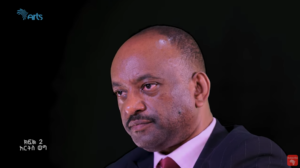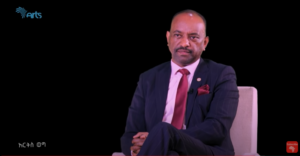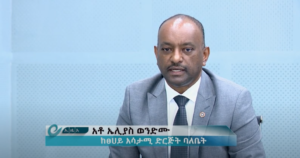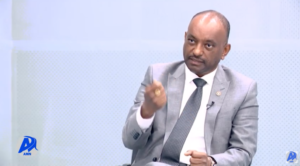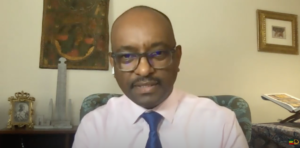LMU MAGAZINE – Elias Wondimu spent his first 20 years growing up in Ethiopia, a country riven by civil war, ethnic conflict and economic chaos. One of the casualties of that strife has been the nation’s history itself, which leaders have often rewritten or erased. As a young man, Wondimu opposed his government as an activist. Today, he is a publisher LMU’s Marymount Institute Press. One of his goals is to secure his nation’s history. Here Wondimu describes his path from activist to historian.
 Elias Wondimu is an exiled Ethiopian journalist and the founder of Los Angeles-based TSEHAI Publishers, which was launched in 1998. Since being unexpectedly exiled from his country in 1994, he worked on general academic journals and books focused on Ethiopia and Africa. In 2007, Wondimu joined LMU’s Marymount Institute for Faith, Culture and the Arts, where he and the director, Professor Theresia de Vroom, established the Marymount Institute Press, which publishes books of academic and broad interest. This past August, TSEHAI Publishers launched the Harriet Tubman Press for African American Literature, a new imprint in collaboration with LMU’s Marymount Institute. The press will focus on African and African American fiction, nonfiction and academic titles.
Elias Wondimu is an exiled Ethiopian journalist and the founder of Los Angeles-based TSEHAI Publishers, which was launched in 1998. Since being unexpectedly exiled from his country in 1994, he worked on general academic journals and books focused on Ethiopia and Africa. In 2007, Wondimu joined LMU’s Marymount Institute for Faith, Culture and the Arts, where he and the director, Professor Theresia de Vroom, established the Marymount Institute Press, which publishes books of academic and broad interest. This past August, TSEHAI Publishers launched the Harriet Tubman Press for African American Literature, a new imprint in collaboration with LMU’s Marymount Institute. The press will focus on African and African American fiction, nonfiction and academic titles.
Born in Ethiopia a year before the 1974 Ethiopian revolution that overthrew Emperor Haile Selassie, I was too young to understand the civil war, assassinations and repression that ensued and that my family, neighbors and the entire Ethiopian people endured. But I grew up hearing stories of horror and bravery from a community of survivors and actors.
My formal education started in kindergarten with East German toys and Soviet storybooks. The self-proclaimed communist military junta, known as the Derg, imposed Soviet ideology on the country. My generation was educated — indoctrinated — about the Soviet Union and its revolution and leaders rather than our own. After defeating an expansionist Somalia, what followed for more than 15 years was insurgency and anti-Derg uprisings, an economic crisis, and the looming disintegration of the country.
With the end of the Cold War, the Ethiopian government was forced to debunk its own failed socialist experiment. I was in the 10th grade when suddenly everything we’d been taught about socialism was repudiated, replaced by a so-called mixed economy. No one explained the overnight change.
But, inevitably, the new experiment of the mixed economy failed. The resulting political and economic collapse facilitated the toppling of the government by guerrilla forces. Ethiopians prayed that the Derg’s defeat would usher a miracle in a democratic government. But the guerrilla movement’s leaders were motivated more by an ideology of hatred than by the people’s desire for peace and unity. Hope for peace and democracy remained only a hope.
 A few years later, and no longer a child, I could not sit in silence in the face of a blatant policy of ethnic divide-and-rule. Two friends and I collected automatic weapons, determined to set off for the Bale Mountains, south of Addis Ababa, to join a guerrilla force. But when one of my friend’s sisters found out, we were forced to abandon the plan. Willing to act as a lone wolf, I started preparing a new plan, but my intolerance for injustice interfered. With the streets of Addis Ababa blocked off for the visit of a foreign president, I intervened in a beating by soldiers of an elderly man and was myself severely beaten, a rifle pressed to my forehead. The coincidental passing by of the president’s motorcade saved my life. After that, friends helped me change my ways.
A few years later, and no longer a child, I could not sit in silence in the face of a blatant policy of ethnic divide-and-rule. Two friends and I collected automatic weapons, determined to set off for the Bale Mountains, south of Addis Ababa, to join a guerrilla force. But when one of my friend’s sisters found out, we were forced to abandon the plan. Willing to act as a lone wolf, I started preparing a new plan, but my intolerance for injustice interfered. With the streets of Addis Ababa blocked off for the visit of a foreign president, I intervened in a beating by soldiers of an elderly man and was myself severely beaten, a rifle pressed to my forehead. The coincidental passing by of the president’s motorcade saved my life. After that, friends helped me change my ways.
“One bullet could stop you for good,” said one. “If you write what you are talking about, people could learn something, and they may even know what to do next.”
I did as advised and wrote a political essay, not knowing its full impact until I shared a taxi with eight strangers who were talking about my article. I realized that day that I was saved by journalism. Nonetheless, in the following years, the press found itself increasingly at odds with and methodically stifled by the government.
In September 1994, I took a three-week trip to deliver a paper at the Twelfth International Ethiopian Studies Conference at Michigan State University. During my absence, the government heightened its campaign against freedom of the press, and many of my colleagues were harassed, imprisoned or forced into exile. It became clear that my return to Ethiopia would spell certain danger. My brief visit to the United States turned into indefinite exile.
The personal costs of my years in exile have been high: On the telephone, I listened to my mother die, as I was unable to return to her side. And I carry the knowledge that my actions have forced my entire family into exile in Kenya, where their safety is more certain.
Yet, as a publisher of books, I consider myself blessed to be working with scholars, artists, novelists, former presidents, prime ministers, opposition leaders and journalists to fill the void of Ethiopia’s vast history — a void created, in part, by politicians.
I grew up a proud Ethiopian, and, like many of my generation, I am determined to leave a better world than that which I inherited. I hope to give a context to our history, so that the next generation can write their stories and right the wrongs of the past guided by informed historical reference. This is what fuels my day-to-day work at TSEHAI and all its imprints. That is why now, even if I disagree with an author, I fight for his or her right to be published. Otherwise, all words will be lost in death. In my line of work, my only enemy is time itself.
Source: LMU Magazine (Winter 2016)

